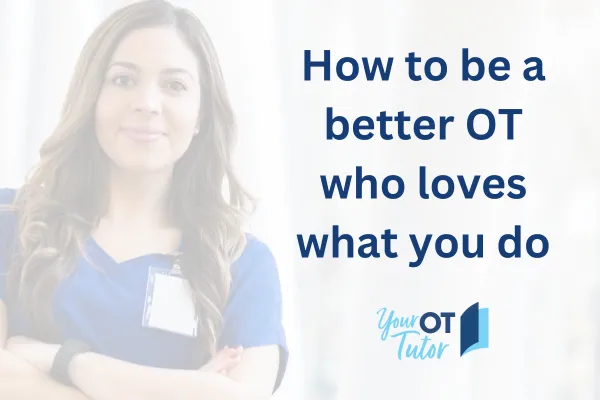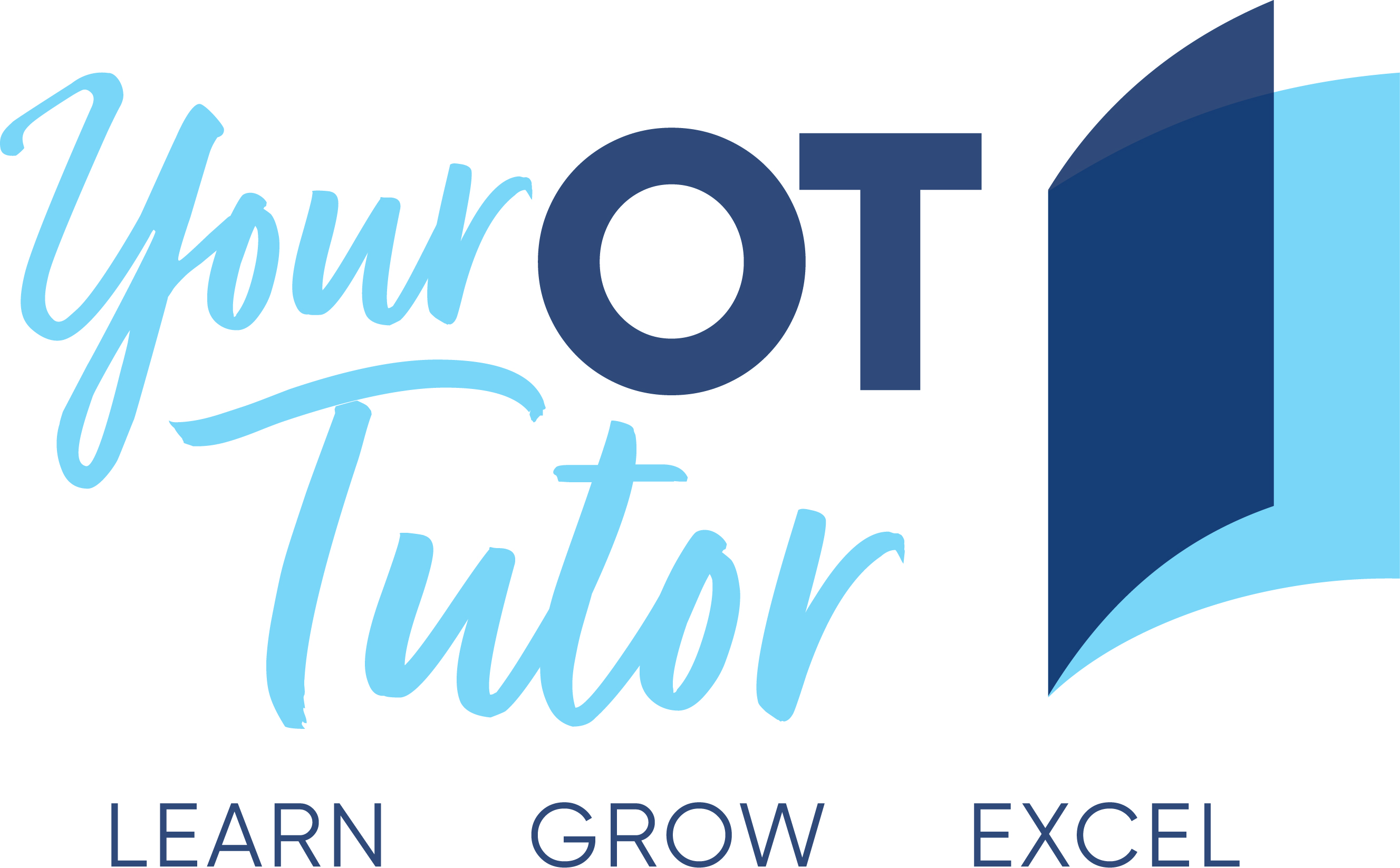THE YOUR OT TUTOR BLOG
Some short articles on important topics for occupational therapists...
Hi, Clare here...I often see recurring questions or topics come up in OT discussion boards or networking events, so I have created some short articles on some of these topics.
Got a question or topic in mind?
If you have a particular topic or question that you'd like me to cover in a blog post, please send me your suggestion via the Your OT Tutor enquiry form and I'll add it to my list!


How to be a better OT who loves what you do
I’m posting this article while I’m in transit heading home from the OT Exchange in Perth. For anyone that’s ever been to an OT conference, you’ll know you always leave feeling full of motivation, and with a warm, fuzzy feeling that you’re part of something big. And in the case of OT, something that can make a real difference to the lives of people experiencing disability, injustice, or deprivation.
For those who attended, you may be wondering where you can start. The answer is going to be different for each OT, but when I thought about how I teach clinicians to be better OTs who love what they do, it always came back to one of these eight things. I call them my foundations of OT success.
If you’re needing some inspiration for how you can take the next step in your OT journey, whether you attended the conference or not, take a look at these.
1. EMPOWER YOURSELF
Consider your own needs first. It’s a saying that gets used a lot but it’s true – you can’t pour from an empty cup. OTs are working in complex caseloads, while also dealing with stretched finances and hostile political atmospheres, so it’s no wonder we’re feeling exhausted. While we always want to look after others, we need to remember to put ourselves first sometimes. This can be about making time for self-care, self-compassion and building resilience. But it can also be about making time for engaging in self-reflection and supervision, setting impactful CPD goals, and finding opportunities for career progression, to ensure your passion for learning and professional fulfilment remains central to your OT experience.
2. THINK LIKE AN OT
Sometimes when working in broken systems we can fall into the habit of practicing only within the boundaries these broken systems create, instead of remembering to think like an OT first, and then pushing these boundaries when we need to. Here’s an example. During the conference an OT told me that many OTs she knows don’t even bother exploring the option of companion beds for their NDIS-funded clients anymore. They’ve had a couple of knock-backs from the NDIS saying they won’t fund it, so now it’s not even an option they try to explore for their clients, even though the justification is well and truly there if they decided to push back. We need to find ways to unleash the power of thinking like an OT by using models, processes, frameworks, and principles to guide a client-centred, holistic approach to our practice.
3. BE A PROUD #OTNERD
Those who know me are aware I claim this title with enthusiasm – there is nothing wrong with being a proud #OTNerd who embraces the world of evidence-based practice. There were so many great presentations at the conference, filled with many eager listeners, so I’m know I’m not alone. We need to find ways to create, find and use research evidence to support our practice, but at the same time, we can’t forget that this is only one component of being an evidence-based practitioner. We should be blending client values, resource considerations, and our own personal expertise to craft the optimal therapeutic approach.
4. CONNECT AND COLLABORATE
Well, there was plenty of this happening at the conference. We can achieve so much when we pull together and show up as a collective force to be reckoned with as a profession. But we can also achieve great outcomes if we collaborate with other professions, as well as our clients and their support network. To do this we need to make time to build our skills in effective communication, interpersonal interactions, and rapport building. We also need to make time and space within our client sessions so we can do this collaboration well, not in a tokenistic way or as an afterthought.
5. BE AN OT DETECTIVE
This was the underlying focus of many presentations and posters at the conference. How are you showing up as an OT detective? What tools can you use to elevate your ability to gather comprehensive client information? Where are your own gaps? Do you need to practice your interview and observation skills, become familiar with the latest standardised assessments and outcome measures, or revisit activity analysis 101 so you can facilitate targeted and effective therapy sessions?
6. SOLVE PROBLEMS, CHANGE LIVES
This is what we’re good at. Something that seems simple to us could be life-changing for the people we work with. And there are so many tools at our disposal to achieve this. It could mean embracing the latest tech or assistive technology, or learning ways to support our clients to build their skills in a range of areas through adapting and grading activities. It could even be something like getting really good at writing reports that tick the boxes we need to tick so that “the powers that be” have no option but to agree with our recommendations. It’s through all these types of service provision that we can help our clients overcome barriers to improve their function, participation, and quality of life.
7. TEACH AND TRANSFORM
Maybe you’ve been reading along to this point and you’re thinking, “You know what, I actually do those things pretty well already.” Fantastic! Now we need you to take the next step to embrace your inner teacher and pass on your knowledge and skills to the next generation of OTs. I heard lots of discussions about the challenges our OT students and new graduates are facing, from placement poverty, to finding themselves in workplaces that don’t see early career clinician support as a priority. For those feeling good about their clinical skills, maybe your next step is to gain confidence in providing supervision, teaching students, mentoring, leading others, and extending your impact through providing team education and external training.
8. RAISE THE BAR
For everyone who presented at the conference, you’re already demonstrating this foundation of OT success; you’re elevating your impact through showcasing the awesomeness of OT. You’re going beyond your day-to-day clinical work and diving into quality improvement and research. You’re stepping up to join associations and committees. Or maybe you’ve decided now is the time to embrace the power of social media and tell and show everyone the amazing things OTs can achieve. It’s taking these steps that will help the impact of OT be truly appreciated.
So, which foundation of OT success resonated with you? What changes can you make to your practice to ultimately be a better OT who loves what they do?
If you need a tribe to help point you in the right direction, consider joining the Your OT Tutor membership, the YOTT Alliance. You can access on-demand and live workshops on each of these foundations, or come along to a “Clarity with Clare” Q&A Zoom session each month and we can try to figure it out together. The links you need are in the comments.
#OccupationalTherapy #YOTTAlliance #NDIS #EvidenceBasedPractice #ClinicalEducation






